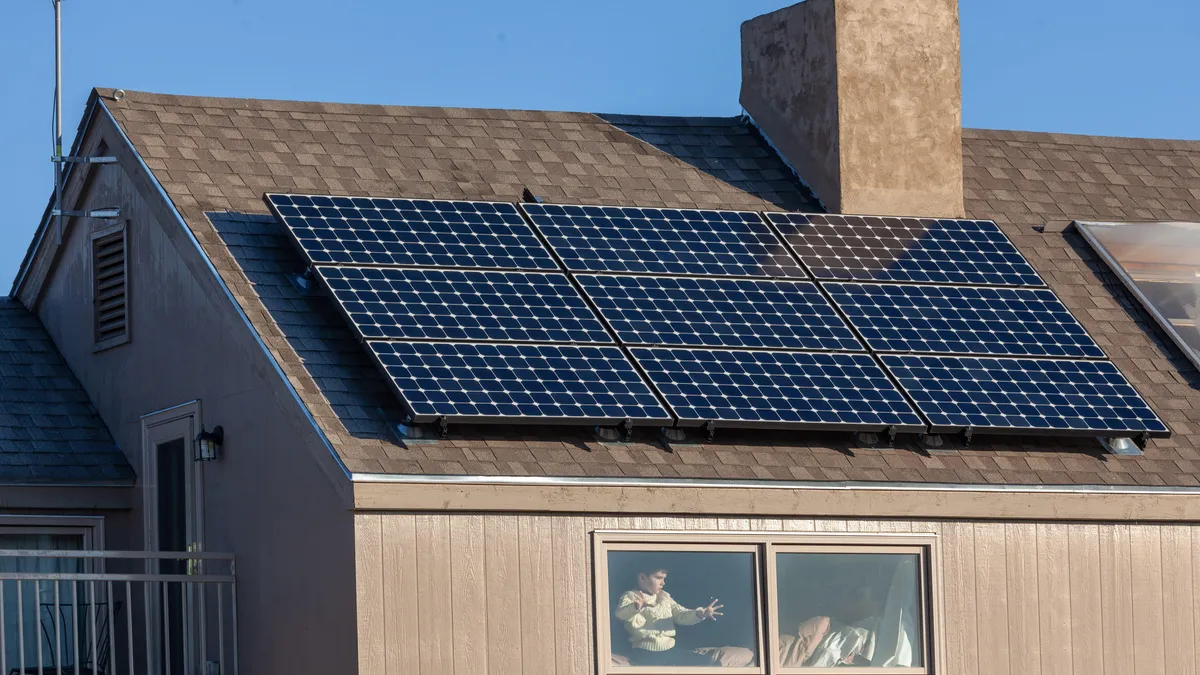Mientras el costo de la electricidad sigue aumentando, Cada vez más usuarios eligen la energía solar como solución para reducir sus facturas de luz.. En este articulo, Exploraremos cómo puede utilizar la energía solar para ahorrar dinero en sus facturas de electricidad..

¿Cuánto cuestan los paneles solares?
El costo de los paneles solares oscila entre $8,500 a $30,500, con un sistema solar promedio de 6kW que cuesta aproximadamente $12,700 y cada panel solar de 350W cuesta aproximadamente $995. El coste exacto depende del tamaño de la instalación y de sus necesidades energéticas., y saber exactamente dónde es probable que se produzcan los costos puede ayudarle a presupuestar sus paneles solares para lograr el máximo ahorro de energía..
Si quieres saber el coste de los paneles solares específicamente, Puede hacer clic en el botón a continuación para leer este artículo detallado..
Cómo ahorrar en facturas de electricidad con energía solar
Cómo ahorrar en facturas de electricidad con un préstamo solar
Si bien el uso de energía solar a través de un préstamo genera una segunda factura, La electricidad generada mediante paneles solares debería ayudar a compensar significativamente su factura de electricidad., por lo que el costo combinado es menor que su autofacturación original no solar. El objetivo entonces es encontrar un equilibrio en el que tengas suficientes paneles solares para generar la energía que tu hogar necesita., pero no tantos como para que no valga la pena el coste extra.
Aquí tienes un ejemplo de cómo utilizar un préstamo solar para ahorrar dinero en tu factura de electricidad.:
Primero, necesita comprender las opciones de préstamos solares disponibles. Esto puede incluir préstamos de bancos., cooperativas de crédito, empresas solares o agencias gubernamentales, comparar las tasas de interés y las condiciones de diferentes préstamos.
Segundo, elija el préstamo solar que se adapte a sus necesidades y situación financiera y comience el proceso de solicitud. Es posible que se le solicite que proporcione información financiera y un plan de instalación para su sistema solar.. Antes de hacerlo, También debe determinar el costo del sistema solar que planea instalar., así como la vida útil del sistema solar.
Una vez que haya obtenido un préstamo solar y lo haya aprobado, Usted puede organizar la instalación de su sistema solar.. Asegúrese de elegir un instalador experimentado y seguir todas las normas locales de construcción y seguridad.. Pague su préstamo solar a tiempo de acuerdo con los términos de su préstamo.

Cómo ahorrar en facturas de electricidad al comprar paneles solares en efectivo
Otra opción es precomprar un sistema de paneles solares en efectivo.. La ventaja de esta opción es que no tienes que pagar ninguna tarifa adicional para financiar el sistema a lo largo del tiempo.. La desventaja es que es difícil saber cuánto dinero está ahorrando cuando no tiene un préstamo de pago mensual para comparar sus facturas de servicios públicos., por lo que necesitas hacer algunos cálculos con anticipación para estimar cuánto estás ahorrando cada mes.
Aquí tienes un ejemplo de cómo utilizar un préstamo solar para ahorrar dinero en tu factura de electricidad.:
Primero, determine sus necesidades energéticas y comprenda el costo del sistema solar. Los requisitos de energía incluyen el consumo mensual de electricidad y las facturas de electricidad., y el costo del sistema solar incluye el costo de los paneles solares., inversores, instalación y equipo asociado. Puede obtener cotizaciones y estimaciones contactando con empresas o instaladores solares..
Segundo, necesita utilizar la producción esperada del sistema solar y su factura de electricidad actual para calcular la cantidad de dinero que podría ahorrar. Teniendo en cuenta la vida útil de su sistema solar, También puede estimar los ahorros para los próximos años.. Dependiendo del costo del sistema solar que planeas comprar, preparar suficiente efectivo para pagar.
Finalmente, Elija una empresa o instalador de energía solar con experiencia y reputación. Asegúrese de que ofrezcan productos de alta calidad y servicios de instalación profesionales., y podemos proporcionarle soporte postventa y garantía.. Una vez que haya seleccionado un proveedor de sistema solar y haya pagado por él, Puedes organizar la instalación del sistema solar.. Asegúrese de que el proceso de instalación cumpla con las normas locales de construcción y seguridad y que se sigan los estándares de instalación profesionales..
Una vez instalado el sistema solar, Empezarás a disfrutar de los ahorros.. Tu factura de luz puede verse reducida o incluso negativa en algunos casos, lo que significa que puede obtener ingresos vendiendo el exceso de energía solar a la red..

Cómo ahorrar en facturas de electricidad reduciendo el costo del sistema solar
Medidas de eficiencia energética
Para reducir su consumo total de electricidad, Necesitas mejorar la eficiencia energética de tu hogar o negocio antes de instalar paneles solares. Esto podría incluir medidas como la mejora de electrodomésticos energéticamente eficientes., mejorando el aislamiento, sellar fugas de aire y usar termostatos inteligentes para regular la calefacción y la refrigeración.
Instalar almacenamiento de batería
También puede considerar agregar almacenamiento de batería a su sistema solar para almacenar el exceso de electricidad generada por los paneles para su uso nocturno o durante períodos de baja producción solar., o incluso durante cortes de energía, reduciendo aún más su dependencia de la red y bajando su factura de electricidad. La instalación de almacenamiento de batería aumentará sus costos iniciales, pero si su panel puede generar regularmente más energía de la que necesita, Puedes ahorrar dinero al no pagar esa electricidad a la empresa de servicios públicos..
Cambiar el uso a horas solares fuertes
Si desea asegurarse de que sus paneles solares generen suficiente electricidad para hacer funcionar todos sus electrodomésticos y otras necesidades eléctricas., Es mejor cambiar el horario de uso para usar electricidad durante las horas de sol.. De esa manera, Tus paneles solares tienen mucha luz solar para proporcionarte la electricidad que consumes..
Regístrese para la medición neta
Verifique si su empresa de servicios públicos ofrece un plan de medición neta., que le permite agregar electricidad adicional generada por sus paneles solares a la red. Luego recibirá un crédito de la empresa de servicios públicos para cubrir facturas de electricidad adicionales., lo que ayuda a reducir su factura mensual futura.
Planes de tiempo de uso
Optimice su tiempo de uso y elija un plan de tiempo compartido si hay uno disponible en su área. Los planes de tiempo compartido cobran diferentes tarifas de electricidad según la hora del día., Y puede maximizar sus ahorros alineando su uso de energía con las horas pico y valle..
Sistema de monitoreo de energía
También puede realizar un seguimiento de su consumo de energía en tiempo real instalando un sistema de monitoreo de energía.. El proceso de monitoreo identifica electrodomésticos que consumen mucha energía o comportamientos para reducir el consumo de energía y optimizar el uso de la energía solar..
Cómo ahorrar en facturas de electricidad con paneles solares
Los paneles solares son una forma eficaz de reducir la factura de electricidad de tu hogar o negocio, y al considerar invertir en paneles solares, es importante considerar sus ahorros a largo plazo.
La instalación de paneles solares puede reducir la dependencia de la red eléctrica. Durante el día, Los paneles solares capturan la energía solar y la convierten en electricidad para su uso., lo que puede reducir la cantidad de electricidad que necesita comprar a su empresa de servicios públicos.
Instalando paneles solares, puedes reducir tu dependencia de la red, disfrute de los beneficios de la medición neta y los planes de tiempo compartido, y aproveche los subsidios gubernamentales y los retornos de la inversión a largo plazo para reducir su factura de electricidad.
Una vez completada la instalación, Necesitas mantener los paneles solares limpios y en buen estado., inspeccionar regularmente, limpiar escombros o suciedad, y abordar cualquier problema de manera oportuna para garantizar que su desempeño sea el mejor.
Si bien el costo inicial de los paneles solares puede ser alto, Por lo general, tienen un retorno de la inversión a largo plazo.. Una vez instalado, Los paneles solares a menudo pueden seguir generando electricidad durante décadas., Ahorrándote mucho en tu factura de luz..
¿Qué incentivos fiscales solares puede reclamar?
Crédito fiscal solar federal
El Crédito fiscal solar federal Es un incentivo gubernamental diseñado para alentar a individuos y empresas a invertir en energía solar.. El programa permite a los propietarios de sistemas solares elegibles recibir un crédito fiscal en sus impuestos federales sobre la renta., reduciendo su factura de impuestos.
Los propietarios de sistemas solares pueden recibir un crédito de 30 por ciento del costo de instalación de un sistema a través del crédito fiscal federal solar. Esto significa que si gastas $30,000 en un 10 kW sistema solar, el crédito fiscal federal es equivalente a un $9,000 crédito fiscal.
Para calificar para el crédito fiscal federal solar, El sistema solar debe instalarse en un edificio residencial o comercial que cumpla con las normas y debe usarse para generar electricidad o calentar agua.. El crédito fiscal federal para la energía solar se implementó por primera vez en 2006 y se ha ampliado varias veces. Gracias a la 2022 Ley de reducción de la inflación, el crédito fiscal solar aumentó de 26 por ciento a 30 por ciento. La legislación amplía el beneficio, que estaba previsto que terminara en 2024, hasta 2034. Actualmente, El programa de crédito se ha extendido hasta diciembre. 31, 2023. Sin embargo, el monto del crédito se reduce gradualmente después 2020 y caerá a 10% por 2024.
Ten en cuenta que el ITC es una deducción fiscal, no es un reembolso o reembolso. Si su carga fiscal no es suficiente para reclamar el beneficio en un año, Puedes transferir la diferencia no utilizada al año siguiente.. Si paga sus paneles a través de un contrato de arrendamiento solar o de compra de energía, tampoco puede reclamar un crédito fiscal federal.
Incentivos estatales y locales
Además de los créditos fiscales federales para la energía solar, Muchos gobiernos estatales y locales ofrecen una variedad de incentivos para alentar a las personas y empresas a adoptar la energía solar.. Dependiendo de tu ubicación, puede ser elegible para recibir incentivos adicionales para usar energía solar, que puede combinar con créditos fiscales federales para ahorrar aún más.
El tipo y la cantidad de incentivos pueden variar según la región., pero normalmente incluyen lo siguiente:
Exención del impuesto sobre las ventas: Exención del impuesto local sobre las ventas al comprar un sistema de energía solar.
Exención del impuesto a la propiedad: Si instalar paneles solares aumenta el valor de tu casa, puede estar exento de pagar impuestos a la propiedad más altos.
Créditos fiscales estatales: Algunos estados ofrecen créditos fiscales locales para sistemas solares, similar a los créditos fiscales federales. Estos créditos pueden incluir el impuesto sobre la renta personal, Deducciones del impuesto a la propiedad o del impuesto sobre las ventas para ayudar a los propietarios de energía solar a reducir el costo del sistema solar..
Programas de subsidio: Algunos gobiernos estatales y locales han establecido programas de subsidio solar para proporcionar incentivos financieros directos o subvenciones para ayudar a los residentes y empresas a pagar los costos de instalación de los sistemas solares..
Préstamos a bajo interés: Algunos gobiernos estatales y locales han establecido programas de préstamos de energía solar a bajo interés para ayudar a individuos y empresas a cubrir los costos de instalación de sistemas solares y ofrecer términos de pago flexibles..
Conclusión
Invertir en paneles solares es una decisión de futuro, y si estás preparado para instalar paneles solares para ahorrar dinero en tu factura de luz utilizando energías renovables, póngase en contacto con GYCX Solar hoy. Puede comenzar tomándose unos minutos para obtener productos solares gratuitos y estimaciones de ahorro completando el formulario de cotización a continuación para ver cuánto puede ahorrar al utilizar energía solar..
